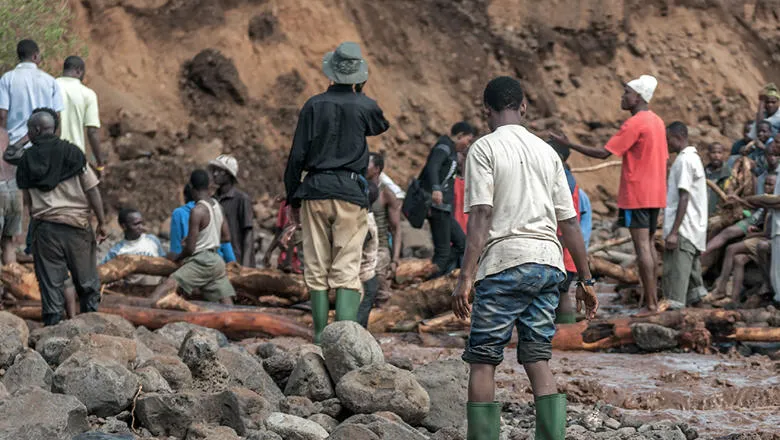For the first time in an IPCC Assessment Report the impacts of climate change have been observed in all regions, in all sectors with some places now being uninhabitable and some species having been made extinct because of climate change – this should be very motivating for rapid and deep mitigation as well as adaptation.
Professor Mark Pelling, Professor of Geography
01 March 2022
Geography academics lead authors on latest IPCC report: climate change affects all forms of life
Climate experts and Geography academics, Dr Helen Adams and Professor Mark Pelling are lead authors on the latest Intergovernmental Panel on Climate Change (IPCC) assessment report, which lays bare the inseparable nature of the biodiversity crisis and the poverty and inequality suffered by billions of people around the world.

The comprehensive UN climate assessment, which is based on 34,000 studies, documents “widespread and pervasive” impacts on people and the natural world from the impact of floods and drought on food crop productivity, to excess deaths and ill health caused by extreme heat events and increasing destruction of property and infrastructure due to cyclones. Some impacts, such as species extinctions driven by climate change, are now irreversible.
The new report looks at the causes, impacts and solutions to climate change, including how humanity can adapt, in addition to slashing emissions.
The good news is that a liveable future remains within grasp, however the window of opportunity for action is “brief and rapidly closing”.
The report is clear that adapting to the climate crisis is as much a social problem as a scientific one and that societal choices and actions implemented in the next decade will determine our climate resilience. The best way to give effective and lasting protection is through action that addresses “inequities such as those based on gender, ethnicity, disability, age, location and income”.
One of the things that I think is really, really clear in the report is that yes, things are bad, but actually, the future depends on us, not the climate. It really highlights that people's vulnerability to climate change is driven by intersecting patterns of socio-economic development and historical – and ongoing – causes of global inequity.
Dr Helen Adams, Senior Lecturer in Disaster Risk Reduction and Climate Change Adaptation
The facts (observed impacts)
- Climate change is contributing to humanitarian crises where climate hazards interact with high vulnerability. Over 40% of the world's population are "highly vulnerable" to climate change related hazards such as heatwave and flooding.
- Hundreds of local losses of species have been driven by increases in the magnitude of heat extremes, as well as mass mortality events on land and in the ocean.
- Millions of people have already been exposed to food insecurity and reduced water security.
- In urban settings, observed climate change has caused impacts on human health, livelihoods and key infrastructure.
- Climate change has adversely affected physical health of people globally and mental health of people in the assessed regions.
- Economic damages from climate change have been detected in climate-exposed sectors, with regional effects to agriculture, forestry, fishery, energy, and tourism.
The facts (our future risk)
- Beyond 2040 and depending on the level of global warming, climate change will lead to numerous risks to natural and human systems.
- Diseases will likely spread more quickly in the coming decades.
- Climate change risks to cities, settlements and key infrastructure will rise rapidly in the mid- and long-term with further global warming, especially in places already exposed to high temperatures, along coastlines, or with high vulnerabilities.
- Climate change also impacts the economy, with projected estimates of global aggregate net economic damages generally increasing non-linearly with global warming levels.
- Climate change will increasingly put pressure on food production and access, especially in vulnerable regions, undermining food security and nutrition.
- Risks in physical water availability and water-related hazards will continue to increase by the mid to long-term in all assessed regions, with greater risk at higher global warming level.
The facts (on adapting to climate change)
- Action on adaptation has increased but progress is uneven and we are not adapting fast enough.
- Growing public and political awareness of climate impacts and risks has resulted in at least 170 countries are including adaptation in their climate policies; cities are integrating climate change into their planning policies.
- There are options we can take in every region and every sector to adapt to climate change, but their effectiveness declines with increased warming.
- Nature offers significant untapped potential, not only to reduce climate risks, and deal with the causes of climate change, but also to improve peoples’ lives and livelihoods.
- To avoid mounting losses, urgent, accelerated action is required to adapt to climate change, at the same time as making rapid, deep cuts in greenhouse gas emissions.
The report was produced by Working Group II, which includes more than 1,000 physical and social scientists and unanimously approved by the governments of 195 nations.
Professor Mark Pelling is a Coordinating Lead Author in Working Group II and his expertise covers the social production of vulnerability to environmental change and hazard. He coordinated ‘Chapter 6: Cities, settlements and key infrastructure’, which assesses climate change impacts and risks to cities, human settlements and key infrastructure, as well as enabling conditions and options for adaptation.
Dr Helen Adams' expertise covers migration and immobility under environmental change and multidimensional wellbeing. She is a Lead Author on ‘Chapter 7: Health, Wellbeing, and the Changing Structure of Communities’, which provides a global assessment of current climate change impacts and projected risks to health, wellbeing, migration and conflict as well as adaptations solutions and climate resilient development pathways.
Dr Tamsin Edwards, also from the Department of Geography, is a member of Working Group I and was one of the lead authors that worked on the IPCC report released in 2021, which cements the “unequivocal” human influence warming the atmosphere. Her expertise covers ice sheets and sea-level rise, and for the assessment, she looked at the range of possibilities for the future of the ice sheet and its contribution to sea-level rise.
The IPCC’s Sixth Assessment Report will be published in full in 2022. It will also include the Working Group III's assessment of methods for reducing greenhouse gas emissions.



